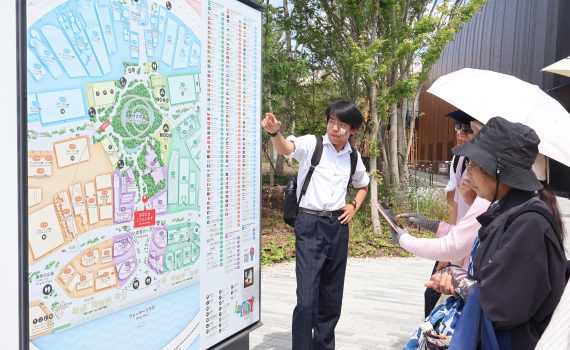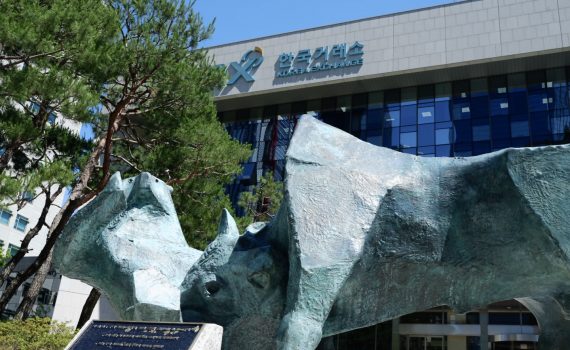The Young Reporter
LGBT-friendly gyms provide safe environment for non-binary bodybuilders
- 2025-06-23
- Society
- The Young Reporter
- By: SIU Tsz Hang、CHEN XiyunEdited by: Lok Tung LAU
- 2025-06-23
There are more than 10 LGBT-friendly gyms in Hong Kong, targeting the LGBT+ community in Hong Kong. It is to provide a comfortable place for the LGBT and to ensure they feel safe and secure. Reported by Henry Siu Tsz-hang, Richard Chen Xiyun Edited by Canny Lau Lok-tung
Confusion over navigation app at Osaka Expo 2025
- 2025-06-09
- Society
- The Young Reporter
- By: ZHANG Yiping、CAO JiawenEdited by: CAO Jiawen、ZHANG Yiping
- 2025-06-09
Osaka Expo 2025 is supposed to showcase futuristic technologies, but some visitors experience were confused by the official app which was meant to offer with navigation and language support. The app, called “EXPO 2025 Visitors”, has a 2.3/5 rating on Google Play with over 500k downloads, with many users complaining about the slow function, clunky interface, and glitchy performance. “It would be nice if they had a map with the pavilion names on the app, because we have to click on every button to see what it is,” said Frank Johnson, 37, a tourist from the United States. “First we used the maps on the website and then the maps on the app, but we kept getting lost,” said Helen Okoro from the United States. “It’s because there aren’t really any signs with pavilion names in general.” Tourists can buy a paper map for 200 yen at the venue, but the line is usually very long. According to the official website, the map is not distributed free of charge due to sustainability concerns. Across the venue, groups of volunteers are placed to help visitors find their way. “Lots of tourists need help with directions in the venue,” said a Japanese volunteer who chose not to reveal her name for fear of getting into trouble. “It is generally circular, so it’s hard to tell the direction,” she added. Angela Zhou, a Chinese visitor aged 28, said the paths inside the venue are confusing. “Google Maps is much more useful compared to their official app,” she said. “It allows you to directly search for each pavilion and head straight to it, while the official app is slow.” “Many of the app’s functions require you to visit the website on a browser. For example, clicking on the booking button on the app just …
Photo Gallery: South Koreans choose their new president after six months of political chaos
- 2025-06-05
- Society
- The Young Reporter
- By: Wang Yunqi、BO ChuxuanEdited by: BO Chuxuan
- 2025-06-05
The South Korean presidential election wrapped up with liberal party leader Lee Jae-myung winning the presidency and being sworn in on June 4, bringing an end to six months of political chaos since martial law. Lee Jae-myung won with 49.42% share of votes, amounting to 17,287,500 ballots, the largest number of votes in South Korean presidential election history, according to Yonhap News Agency, while voter turnout reached 79.38%, the highest since 1997, reflecting a high level of public mobilisation. Besides Lee’s victory, Kim Moon-soo, leader of the conservative People Power Party, received 41.15% of the vote, as the previous party leader’s martial law declaration received wide criticism, with Lee Jun-seok of the Reform New Party securing 8.34% of the votes, who emphasised on political reform and youth empowerment. The remaining two candidates, Kwon Young-guk and Song Jin-ho, received 0.98% and 0.1% of the votes, respectively. According to a May poll conducted by Gallup, there were notable differences in support rates across age groups. Lee Jae-myung enjoyed higher support among people in their 40s and 50s, while Kim Moon-soo was more favoured by those in their 60s and 70s. And Lee Jun-seok received relatively greater support among younger voters. South Korea faced significant disruptions in high-level diplomatic activity following ex-president Yoon declaring martial law on Dec. 3, 2024, with domestic investors suffering “roller coaster” fluctuation of both the stock market and currency, also driven by the tariff policy initiated by US President Donald Trump. With concerns for the country’s social and security landscape raised, Lee outlined five key missions for his administration during his victory speech, including ending internal conflict, achieving national unity, revitalising the national economy, ensuring national security, and maintaining stability on the Korean Peninsula. “This is a world where things like martial law shouldn’t exist”, said Lee Eungyeong, …
South Korea Presidential Election 2025: Korean stocks surge more than 2% after the country’s new president announced
- 2025-06-04
- Business
- The Young Reporter
- By: BO Chuxuan、Wang YunqiEdited by: BO Chuxuan
- 2025-06-04
South Korea’s benchmark index surged 2.7% to 2770.84 at close on Wednesday (as of 3:30 p.m. local time) after Lee Jaemyung brought the presidential election to an end with his widely-expected victory at midnight. The Korea Stock Exchange KOSPI Index opened with a rise of 1.4% after a one-day recess due to the election holiday on June 3, reaching a closing high of 2770.84 – the highest level in over 10 months. The index has gained 20.8% since April lows triggered by concerns over Trump’s reciprocal tariff policies. Financial stocks saw significant gains today, with Bookook Securities surging more than 22% while Mirae Asset Securities, SKSquares, and Shinyoung Securities rose about 13%, charging the KOSPI higher. During his campaign, Lee Jae-myung proposed a series of financial policies, such as customised financial services for the underprivileged and debt relief for small business owners. Tech stocks are also leading gains among other component stocks. Chip and appliance maker Samsung Electronics gained 1.8% to 57,800 KRW, with the semiconductor manufacturer SK Hynix surged 4.8%, and aero engine-savvy Hanwha Aerospace gained 1.2%. Lee claimed his presidency and delivered a speech in front of the National Assembly, prioritising the revision of the economy and livelihood to alleviate economic hardship as his second priority in his incoming administration, following the restoration of democracy. “From the moment my victory is confirmed, I will devote every effort to recovering your livelihoods—quickly and decisively,” he said. Lee has also promised to boost the economy by increasing government spending, improving corporate governance, strengthening labour protection, and wrapping up the ongoing tariff talks and exchange rate negotiations with the Donald Trump administration, which may contribute to stabilising market sentiment. The South Korean won strengthened against major currencies on Wednesday, trading at around 1,363 per dollar and 946 per 100 yen as …
Gender-neutral toilets, Hello Kitty and Gundam highlights at the Osaka Expo
- 2025-05-29
- The Young Reporter
- By: LI Sin Tung、CHEN Yik NamEdited by: Jenny Lam
- 2025-05-29
What is the Osaka Expo? The Osaka World Expo opened on April 13, and it is the first post-COVID Expo. Over 160 countries, regions, and organizations are exhibiting their futuristic displays in over 80 pavilions, each with distinctive architectural designs. It is the second Expo in Osaka. The last one was in 1970. This year, it is in Yumeshima, or “dream island”, a reclaimed industrial waste burial site in Osaka Bay. The theme is “designing future society for our lives”. Each pavilion is divided into four zones: Connecting Lives, Saving Lives, Empowering Lives and Future Life. Osaka Expo will run for 184 days until 13 October, 2025. What is the Grand Ring? The Grand Ring, designed by Fujimoto Sou, is the largest wooden architectural structure in the world, measuring 20 metres high and having a 2-kilometre circumference. It is constructed using a fusion of modern construction methods and traditional Nuki joints, such as those used in the construction of Japanese shrines and temples. The Grand Ring cost about 35 billion yen (HK$1.9 million) to build and used around 27,000 cubic metres of wood. “You can get such a great view of so many pavilions from the Grand Ring,” said Asa, a 30-year-old visitor from Saga, Japan. Asked about the “waste of money” discussion of the Grand Ring, Asa said she does not think there is anything wrong with the spending. “It is a big international event, so these expenses are necessary,” she said. A Hong Kong visitor, Steven Gong, 40, said the cost of the architecture is not worth it. “It is beautiful, but it is also a waste of resources and money if it cannot be reused,” he said. The Japan Association for the 2025 World Exposition will consider recommendations from private enterprises and public organisations on how to …
Number of visitors at the Osaka Expo hits record high
- 2025-05-29
- Society
- The Young Reporter
- By: ZHANG Yiping、CAO JiawenEdited by: CAO Jiawen、ZHANG Yiping
- 2025-05-29
The Osaka Expo drew approximately 139,000 visitors on May 23rd, breaking the record for the highest number of visitors on a single day, despite ongoing complaints over confusing booking systems and long waiting times. The total number of visitors exceeded 5 million on May 26th, 44 days into the six-month event, according to the Japan Association for the 2025 World Exposition. But that still falls short of expectations, as the Expo is projected by the association to have a total of 28.2 million visitors (150,000 daily). “The waiting time for each pavilion is very long,” said a Japanese couple, Kayo Aoshima and Yoshiaki Aoshima, aged 82 and 78. “We went to the Arab Pavilion, where we had to wait for more than 30 minutes.” Kayo added. Pavilions at the Expo have different admission strategies. While a few only allow for those who have booked in advance to enter, others allow on-site queuing. With each ticket, visitors can make one reservation for one pavilion or event through a lottery system seven days before their visit. They can also reserve or adjust bookings during the three days leading up to their visit, which operates on a first-come, first-served basis. “We have visited many pavilions, such as the USA, Colombia, and the Netherlands, ” said David Aragon, 40, a Mexican tourist.“We had to wait for around one hour at each one of them.” “Maybe more info outside the pavilions to know what is inside and exactly where we can enter something,” added Aragon. Nishijima Ryo, chief of Japan Association for the 2025 World Exposition, who was overseeing work at the Future of Life Pavilion, explained why only visitors with reservations could be admitted. “In this pavilion, you can wear an earphone device and experience the exhibition,” he said. “The number of machines is limited, so we limit …
Piu Sik parade returns to Cheung Chau on Buddha’s birthday
- 2025-05-09
- Society
- The Young Reporter
- By: AO Wei Ying VinciEdited by: AU YEUNG Jim
- 2025-05-09
Some 20 floats paraded down the streets of Cheung Chau along with children dressed up as celebrities on the annual Jiao Festival on May 5, the Buddha’s birthday. The parade kicked off at Pak She Street at 1:30pm, passing through New Hing Street, Tai Hing Tai Road, Secondary School Road, Chung Hing Street, Tai Choi Yuen Road, Tai Sun Back Street, Hing Lung Main Street, New Hing Back Street, and concluded at Pak She Street again at around 4:30pm. Cheung Chau Jiao Festival, also known as the Bun Festival, is a Hong Kong folk festival that’s supposed to give thanks to the deities. This year, characters from mainland Chinese animation Ne Zha 2 were a hit. Children also dressed up as National Games athletes, members of the “KK Park” scam group in Myanmar that detained Hong Kong residents, and the Hong Kong police’s anti-scam mascot “Little Grape.” The children in costumes, known as Piu Sik, sat on stilts carried by adults during the parade. One of the performers included a girl wearing a sun hat and an orange shirt holding up a sign, to warn the public against scam farm jobs. Spectators lined the streets under the scorching sun and in the humidity. “This is my first time at the parade. My favourite “Piu Sik” is Ne Zha because I liked the movie a lot,” said Xuan, 10, a Beijing tourist in Hong Kong with his parents during the “Golden Week” holiday in the mainland. “I think this year’s Piu Sik parade is not exceptional since I have attended this event for 20 years already,” said Poon Lai-yin, 50, a Tin Shui Wai resident. “I hope I don't have to wait too long for the ferries when I leave. The arrangement last year was really messy.” On-site police announced crowd …
Navigating Hong Kong malls with sight impairment
- 2025-05-07
- Society
- The Young Reporter
- By: CHEN Yik Nam、LI Sin Tung、CHAN Wing Yiu、Cheuk Chi Maggie YEUNGEdited by: Jenny Lam
- 2025-05-07
Accessible facilities, especially tactile paths for the blind are either inadequate or improper in most of the malls, no matter in Hong Kong or Shenzhen. Despite the government regulations on accessibility for people with sight impairment, related malls’ respondents and government departments avoid replying directly.
Closure of Deliveroo Reveals Unfair Work Conditions, Users Concerned about Delivery Fee
- 2025-05-04
- Society
- The Young Reporter
- By: ALISHIBA MATLOOB、Wing Chi HOEdited by: Chun Lim LEUNG
- 2025-05-04
After nine years, British food delivery giant, Deliveroo, officially ceases operations in Hong Kong. As the platform shuts down, riders and users are left with the impacts of shrinking wages and legal gaps, rising delivery fees, and fewer choices. Our reporter Gigi Ho reveals how the remaining platforms may be driving a deeper crisis in worker protections, given in example in Keeta’s "K-GO", a system that promises more orders in exchange for lower pay. (April 7, 2025) Reporter: Ho Wing-chi, Alishiba-Matloob Editor: Chun Lim LEUNG
As Australia’s Indigenous Languages Disappear, Experts are Working to Save Them
- 2025-04-30
- Society
- The Young Reporter
- By: CHAU Wing YauEdited by: KURNIAWAN Trista Vania
- 2025-04-30
Indigenous languages in Australia are endangered. Australia has more than 250 Indigenous languages and around 800 dialects, but only 150 are still spoken today, according to the Australian Insitute of Aboriginal and Torres Strait Islander Studies, From European colonisation in the 18th century until the mid-20th century, Aboriginal communities were forbidden to speak their Indigenous languages. Now, most fluent speakers are elders and younger generations often don’t speak them at all. Last month, the Australian government unveiled its 2025 budget which included AU$ 3.6 million to continue digitising at-risk audio and video collections of Indigenous languages. We spoke to experts working on preserving and revitalising these languages for the next generation.










